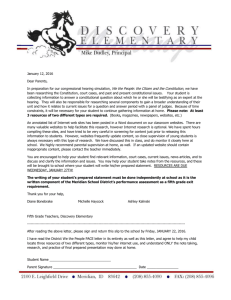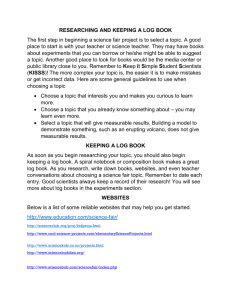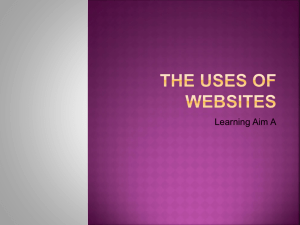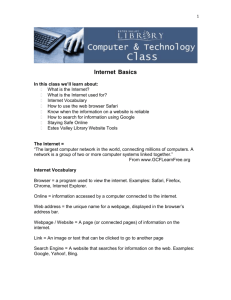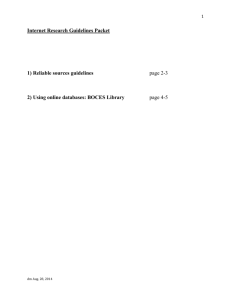Evaluating Sources PPT CARRDSS POWERPOINT
advertisement
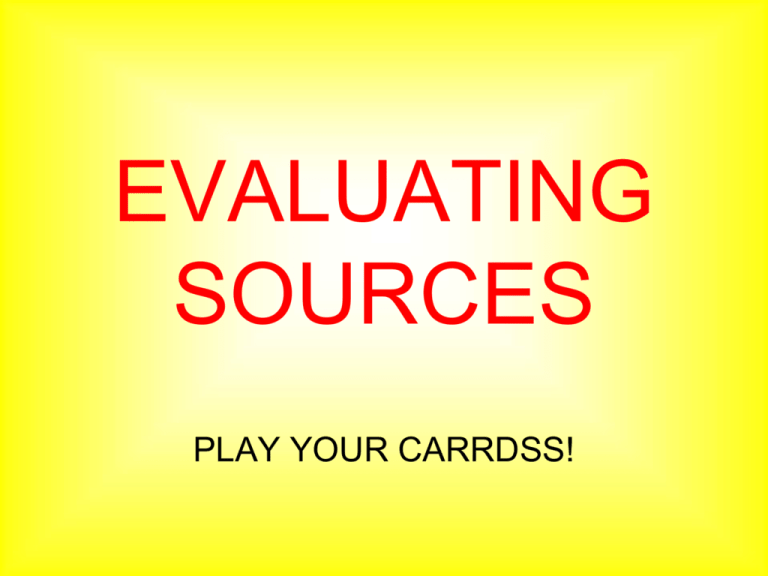
EVALUATING SOURCES PLAY YOUR CARRDSS! CARRDSS CREDIBILITY • What makes this person an authority on this topic? • What can you find out about them? Google author names. • • • • • Education Experience Publications Links to Others Links from Others EDUCATION? • Does this person have an advanced degree? • Is the degree in something related to the topic of the website? EXPERIENCE? • What has the author done in this or related fields? • What else has s/he done that might prepare him/her to be an authority on this subject? PUBLICATIONS? • Has the author published books or articles in print? • Have the author’s articles been cited, quoted, or included in other reliable publications or websites? LINKS TO OTHERS? • Are there links to other reliable sources to show where the author got his/her information? • How do you know those links are reliable? • Does the author link only to other pages in his or her own website? WHO LINKS HERE? • What other websites include links to this website for their viewers? – Google this: link:URL (no spaces) for a list • Can you consider those websites reliable? ACCURACY • Are the facts and statistics correct? • Can you verify them elsewhere? • Are their speeling or grammer misteaks? LOOK AGAIN! • Facts and statistics should be current and accurate. • Spelling or grammar mistakes show a lack of attention to detail and accuracy…what else may be wrong? • Always double-check facts and statistics with other authoritative sources. RELIABILITY Is it really telling you everything? CHECK FOR BIAS • Biased websites present one side of an argument as if it is the whole truth. • May be useful for persuasive papers but not as only source for research. BUT THE FACTS ARE RIGHT… • Biased does not mean false. Facts presented may be true. • Bias does mean slanted. Some facts may not be presented at all. Statistics may be manipulated. FIND THE BALANCE • Enough sources to learn all points of view • Sources that accurately present both sides at once without taking sides. RELEVANCE • Does it answer the question you are asking? Q: Was George Washington a good General? Sources: George Washington the Farmer George and Martha: a Love Story • Is it general information rather than specific? George Washington and the Revolution. How George Washington started the French and Indian War. The Presidency of George Washington All these sources are about GW. Should you use them all? DATES • Check the publication year, date posted, or date updated in books or websites. • Use the most up-to-date information you can find • If there is no date, proceed with caution. http://en.wikipedia.org/wiki/Mystery_Date_%28game%29 ONLINE “DATING” • • • • • Home page About us Copyright (often at the bottom) On individual pages/articles Or not there at all SCOPE & PURPOSE http://jaxteeth.wordpress.com/ WHY? WHO? • Why was the website created? • Who is the website’s target audience? TOO SHALLOW? • Source may be for a younger audience. It will not have as much information as you need. TOO DEEP? • Source may be for specialists. It may be too hard for you to understand and assume too much prior knowledge. JUUUUST RIGHT! • Scope and purpose match the scope and purpose of your assignment. • Written at a level you can understand http://www.surlalunefairytales.com/illustrations/go ldilocks/tarrantgoldy2.html SOURCES • Where did your source get his/her information? • Links? • Bibliography? • In-text citations? CHECK THE SOURCES! • Click on links – are they live? Authoritative? • Google authors’ names – who are they? • How to read a web address: http://novemberlearning.com/educationalresources-for-educators/information-literacyresources/4-how-to-read-a-web-address/ • THERE ARE NO GUARANTEES! VERIFY BEFORE YOU USE INFORMATION! SOME (GENERALLY) AUTHORITATIVE SOURCES • Museums • Look for – Peer review/vetting • Universities (some) – .gov file extensions • Government – Lists of sources websites – Dates/updates • Journals • Databases of vetted sources

